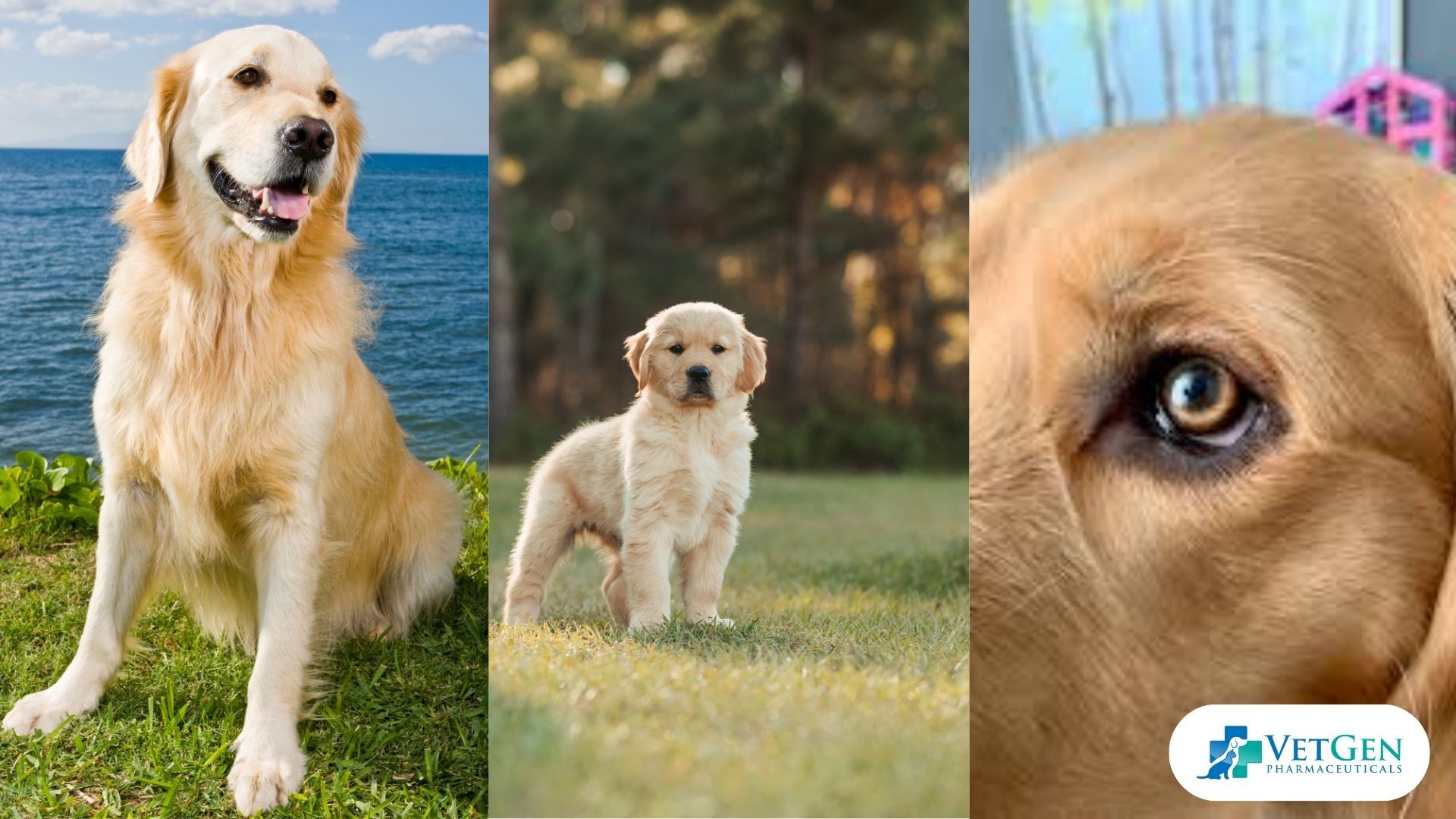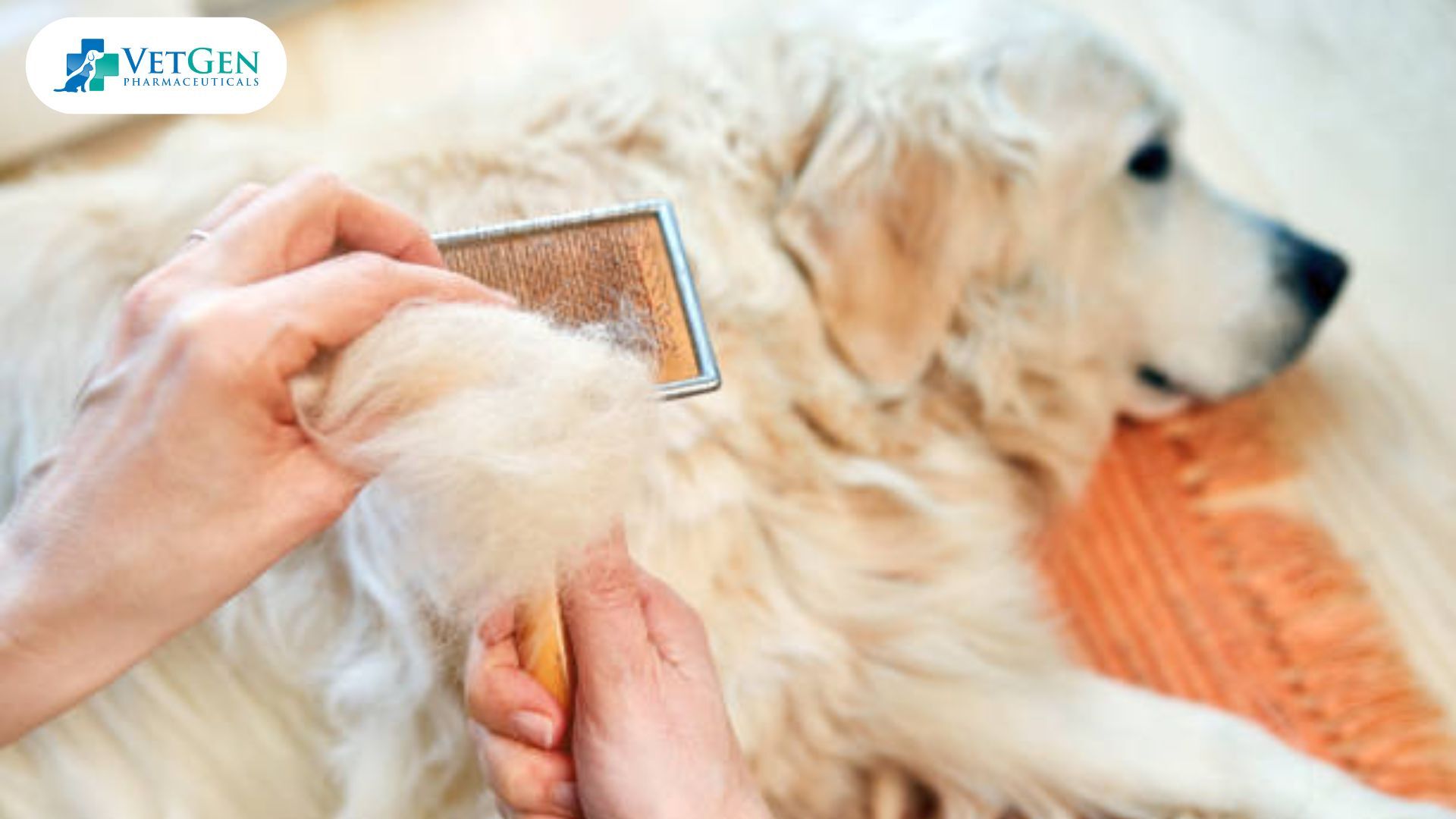Golden Retrievers are one of the most loving and exuberant dog breeds and are commonly adopted in America. These beautiful Scottish gundogs are highly active and are serious working dogs, which is why we can see them employed for field work and hunting purposes.
Moreover, Golden Retrievers can be the best guides for visually impaired people and help the cops or intelligence teams with their search-and-rescue duties. We will learn more about the unique characteristics and provide some valuable information about this medium-sized retrieving dog breed.
Characteristics of Golden Retrievers
We will learn about the various characteristics and physical traits of these hunter-dogs.
- Height: A Golden Retriever can be about 21–24 inches tall shoulder-wise.
- Weight: While males may weigh around 29-34 kg (65-75 pounds), females may weigh about 25-34 kg (55-75 pounds).
- Coat Texture: Golden Retrievers are known for their silky coats and may have double-layered, thick, and water-resistant undercoats. On the other hand, they may have either straight or wavy outer coats.
- Coat Color: Golden Retrievers’ coat shades may vary from the most popular rich gold to pale cream. A few variations include reddish tones.
- Lifespan: A Golden Retriever’s lifespan may range between 10 and 12 years.
- Head: Retrievers have a broad skull and carry an intelligent and friendly mien.
- Eyes: Golden Retrievers have medium to dark brown eyes with a gentle, compassionate, and kind expression.
- Ears: Its ears are usually pendant-shaped and medium-sized and are placed slightly above the eye level.
- Body: A Golden Retriever has a muscular build, symbolizing endurance and agility.
- Size: Golden Retrievers are medium to large breed dogs. While females are usually 21.5-22.5 inches tall, males are 23–24 inches tall.

How Frequently Do Golden Retrievers Shed?
We know it’s not easy to be a Golden Retriever parent with all that fur sticking to every corner of your home, especially the carpets. Yes, Golden Retrievers shed heavily, and they shed consistently year-round. That’s why they have double coats since the shedding becomes more intense during the seasonal transitions of fall and springtime.
This dog breed sheds their undercoats to adapt their bodies to the changing weather conditions and temperatures. Besides, dogs need their coats to protect themselves from harmful foreign elements and pollutants and act as an insulator during the rainy months.
While it’s challenging for Golden Retriever owners who are always busy cleaning and sweeping away their pet’s fur, it’s possible to manage this shedding with regular brushing and grooming. To keep this shedding under control, Golden Retriever parents can brush their pawed companion around 2–3 times per week.
It will help them get rid of the loose fur and prevent these hair strands from sticking onto clothing, carpets, or furniture. Besides, regular grooming and brushing also maintain proper health, appearance, and blood circulation of their coats and skin.

Golden Retriever’s Temperament, Behavior, and Personality Traits
Golden Retrievers usually have a happy, joyful, enthusiastic, and friendly temperament. They are like rays of sunshine, uplifting everybody else’s mood with their energetic vibe. These outgoing and agile dog breeds are extremely sociable, and they survive on human interaction, thus becoming great companions.
They can build strong bonds with their caregivers or owners, which is why families can consider adopting Retrievers for their extreme adaptability to diverse lifestyles and living conditions.
Furthermore, Golden Retrievers are loyal and easy-going with their charming smiles and kind nature. This dog breed can become best friends for children, as their even-tempered and compassionate nature will help your kids learn some crucial life lessons.
Besides having the instinct to please their owners, family members, and caregivers, Golden Retrievers are highly intelligent.
Let’s sum up some behavioral and personality traits of a Golden Retriever.
- Gentle and Kind: Golden Retrievers are great with families, children, and seniors and are naturally patient.
- Sociable: They enjoy being around other animals and people.
- Loyal: Golden Retrievers can bond well with families and individuals and are loyal to their caregivers.
- Intelligent: They are quick learners and, therefore, are easy to train. They are also great at problem-solving and critical thinking and can excel during their training sessions.
- Adaptable: Retrievers can fit themselves well into any lifestyle and living environment.
- Playful: This breed carries an energetic, exuberant, and youthful spirit whenever they go.
- Affectionate: These dogs thrive on human companionship and physical affection. So, yes, they love it when you pet them and spend quality time with them.
- Non-aggressive: Golden Retrievers hardly show aggressive or territorial behavior, as they can adapt to almost any surrounding. They are known for their friendly nature.
However, since Golden Retrievers are highly energetic, they may indulge in unwanted behaviors, like excessive jumping, chewing, rough playing, or pulling on their leash. Therefore, pet parents are advised to train their Golden Retrievers dedicatedly to ensure they grow into well-mannered and well-rounded adults.
Adolescent and Maturity Ages
It’s joyful to see our Golden Retriever pups jump around with enthusiasm, especially in their initial years of life. However, as they mature, they tend to calm down, usually when they are about 2 to 3 years of age, depending on their personality.
Here are some behavioral traits of Golden Retrievers in their adolescent and growing stages.
- Adolescent and Puppy Stages: When a GR pup is between 0–6 months, it is full of curiosity and high energy, as they are acquiring new knowledge and exploring their surroundings. Next, the period between 6 months and 2 years is an adolescent phase for the Golden Retriever, when it is testing its boundaries and may exhibit hyperactive and super-energetic behaviors.
- Maturity: Golden Retrievers start becoming mature when they are 2–3 years of age. They start becoming less hyperactive and more focused as they enter adulthood. Owners should make them participate in regular exercise, training sessions, and mental stimulation activities to manage their energy during this transition from childhood to adulthood.
Key Takeaways for Golden Retriever Parents
We hope this article will help you make better decisions before adopting a Golden Retriever and aid existing Retriever parents in caring for them with the best physical and mental health requirements. To learn more about specific dog breed information and characteristic traits, you can visit VetGen Pharmaceuticals.






